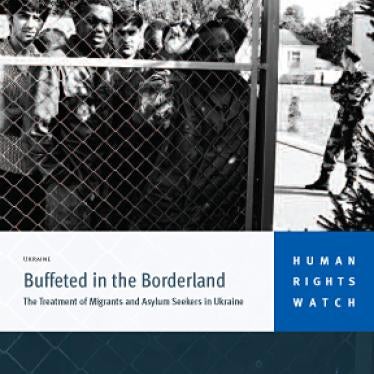(Brussels) - European Union member states and the European Commission should press Hungary as it assumes the EU presidency to address its own serious human rights shortcomings, beginning with a problematic media law, Human Rights Watch said today.
"As holder of the EU presidency, Hungary should embody the EU's principles and values," said Lotte Leicht, EU director at Human Rights Watch. "But when it comes to human rights, Hungary is moving in the wrong direction."
The negative trend in Hungary is epitomized by a widely criticized media law, which entered into force on January 1, 2011, the day Hungary assumed the rotating six-month EU presidency. The country also has a problematic approach to asylum seekers in both law and practice, particularly at the border with Ukraine, Human Rights Watch said. In addition, there is widespread discrimination and intolerance toward Roma, including a failure to stem violent attacks against them.
The new law creates a media control body, with members appointed by the ruling party in parliament. All media outlets will be required to register with the body to operate lawfully.
The panel will be able to impose fines of up to €700,000 (approximately $900,000) on media outlets for "imbalanced news coverage," material it considers "insulting" to a particular group or "the majority" or it deems to violate "public morality." "Gross" violations can result in denial of registration. The law also removes legal protection against the disclosure of journalists' sources, with wide grounds for the media authority to order disclosure.
The media law undermines media freedom and is incompatible with Hungary's human rights obligations, Human Rights Watch said. It is part of a troubling trend of removing checks and balances, including a November 2010 restriction on the power of the constitutional court to review budget laws, Human Rights Watch said.
The media law has already drawn criticism from the Organization for Security and Cooperation in Europe's representative on freedom of the media, international organizations that defend media freedom, and members of the European Parliament. A number of EU governments, including Germany, France, and the UK, have expressed concerns about the law.
The European commissioner responsible for the media, Neelie Kroes, and the Commission president, José Manuel Barroso, who met with the Hungarian prime minister, Viktor Orbán, on January 7, have both sought clarification on the law. Orbán has said that Hungary is willing to amend the law if the EU requires it but only if such changes are made across the EU.
Hungary's approach to asylum and migration also raises serious concerns, Human Rights Watch said. Despite Hungary's assurances that it allows asylum seekers to lodge claims, a recent Human Rights Watch report found that the authorities have returned migrants, including unaccompanied children, to Ukraine, without considering their pleas for asylum in Hungary. Returning migrants without first considering asylum requests breaches the new EU Charter of Fundamental Rights and international refugee law.
A new asylum law, which entered in force in December 2010, remains unsatisfactory despite the success of Hungarian rights groups in defeating the most problematic provisions, Human Rights Watch said. The Hungarian government had sought initially to have the power to detain unaccompanied migrant children and to limit the right to appeal a refusal of asylum. But there are continuing concerns about whether detained asylum seekers will be able in practice to challenge negative asylum decisions effectively.
Hungary's longstanding discrimination and abuse against its Roma minority are also of serious concern, Human Rights Watch said. The Hungarian Helsinki Committee highlighted the inadequate state response to violent attacks on Roma, the forced sterilization of Roma women, and segregation of Roma children in schools in a September 2010 report to the United Nations Human Rights Committee.
Discrimination in access to education and health care for Roma and forced sterilization were also identified as concerns in the EU Fundamental Rights Agency (FRA) Annual Report for 2010. A 2009 multi-country study by the FRA found that 62 percent of Roma surveyed in Hungary reported experiencing discrimination in the previous 12 months.
"The EU's credibility as a reliable and forceful advocate for human rights around the world depends on its willingness to hold its member states to account for their own abuse," Leicht said. "For that reason, it's vital for the Commission and other EU member states to press Hungary to repeal the media law and improve its wider record in accordance with its international and regional legal human rights obligations."







